Success Stories: 7 organizations that took their bee program to the next level
Today, more and more buildings across North America are home to rooftop bee hives, raising awareness about bee-related issues with their thousands of occupants. School bee hive projects use a similar approach, with the aim of increasing our future generations’ ecological awareness.
What these organizations (probably) didn’t expect by bringing bees to their buildings in the first place was just how involved they would get with their hive project. We’ve seen it time and time again since our founding in 2013 – organizations stepping it up every year, increasing their engagement towards the environment and stewardship towards the bees.
Why? Because once a person begins paying attention to the tiny, unassuming world of the honey bee, their perception of the natural world around them starts to expand. Environmental issues that once felt distant and unimportant suddenly take on new urgency. The same phenomenon happens with organizations – companies and schools find themselves wanting to play a bigger role in enacting real systemic change.
So, for World Bee Day, we wanted to put the spotlight on 7 organizations that took their hive project to the next level, bringing about change at their scale, sowing the seeds of awareness or taking concrete measures to help bees, like letting wild flowers and weeds grow on their property, revamping their building’s landscape into bee-friendly gardens or giving out the proceeds of honey sales to local organizations.
WHAT IS WORLD BEE DAY?
World Bee Day is a United Nations initiative whose stated goal is to raise awareness about the fact that bees and other pollinators that form the foundation of our global food supply are increasingly under threat from human activities (particularly industrial agriculture and climate change).
-
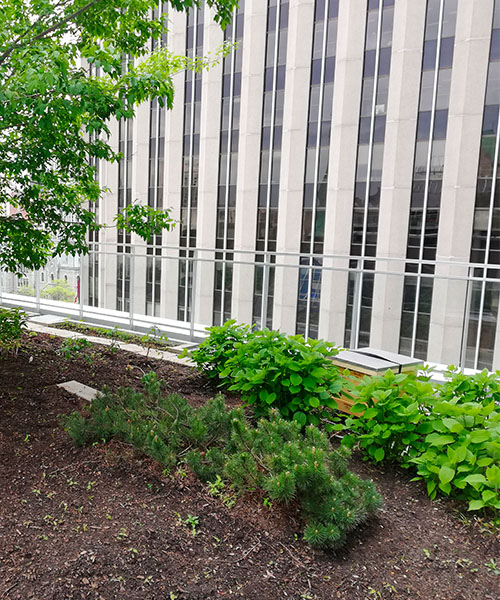
-
CASE 1: MORGUARD (OTTAWA)
As a major real estate organization in North America, Morguard first committed to raising awareness about bees and the importance of pollinators in our food system by setting up hives across a dozen of their properties. But it’s what they did next that is truly inspiring; diversifying their hive project to help all pollinators, as well as creating connection opportunities between humans and bees.
What the bees inspired them to do
- Letting weeds, native and wild flowers grow freely on their properties
- Installing pollinator hotels
- Organizing workshops and outreach activities
- Sponsoring a mural about bees
- Giving proceeds from honey sales to a local hospital
Morguard’s bees inspired them to let weeds, native and wild flowers grow freely around their buildings. The communication campaign that followed – “Pardon the weeds, we’re feeding the bees” – was simple, efficient and impactful, which helped their community to understand the importance of native and local flora for biodiversity. Their naturalized gardens became the perfect spots to install pollinator hotels that provide shelter for native bees and help to raise awareness about these creatures at the foundation of our food systems.
To further increase awareness around their initiative, Morguard took advantage of Alvéole’s educational workshops to spread the word about the important role bees play in pollination. In 2019, they also sponsored a mural by artists in Saskatoon who created a piece portraying the role of bees in food production.
-
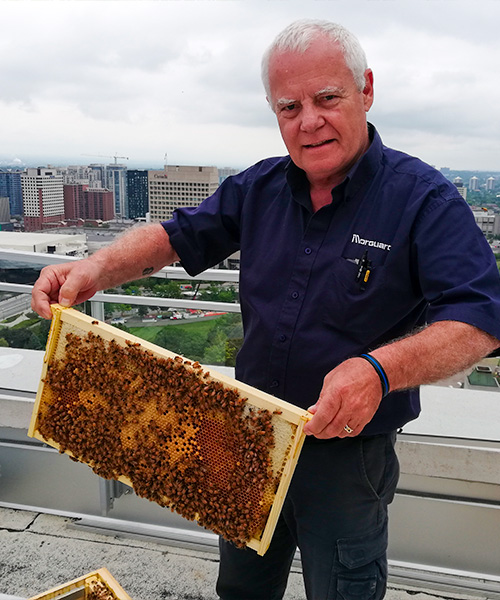
-
Additionally, they decided to do something different with the honey produced in the hives. Whereas before, they used to give their honey to residents, suppliers, staff, retailers, and members of the community (all great ways to spark conversation about the important role bees play in our food production!), Morguard chose last year to sell their honey and give all proceeds generated to the Brampton Civic Hospital – a generous gesture that ended last year’s beekeeping season on a sweet note.
“Following our first harvest [in 2017], we shared the honey and our experience with the tenants and staff, and the response was tremendously positive. There were lots of questions and great feedback. Everyone loved the honey and wanted to learn more about the program.”
– Jill Smith, Regional Manager, Morguard
-
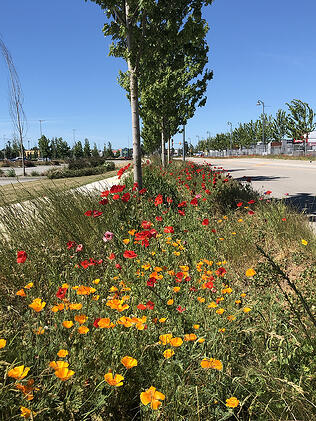
-
CASE 2: TSAWWASSEN MILLS (VANCOUVER)
Did you know that honey bees are only one of the numerous species of pollinators who share our urban spaces? North America is home to thousands of species of bees. Some of them are native to our ecosystems (like bumble bees, leafcutter bees and mason bees) and others are not (like woolcarder bees and honey bees).
What the bees inspired them to do
- Transforming their landscape into a pollinator “buffet”
At Tsawwassen Mills, an Ivanhoé Cambridge property, the beehive project inspired the team to start paying attention to the tiny world of the honey bee – a world shared with thousands of other creatures essential to pollination.
So, instead of planting decorative plants and flowers that offer little to no resources (nectar and pollen) to pollinators, the team at Tsawwassen Mills transformed their landscape into an oasis, filled with pollinator-friendly, native plant species. Their pollinator “corridor”, stretching across the mall, was designed to ensure continuous bloom, offering food for bees and pollinators throughout the summer.
A feast for the bees as well as a feast for human eyes.
-
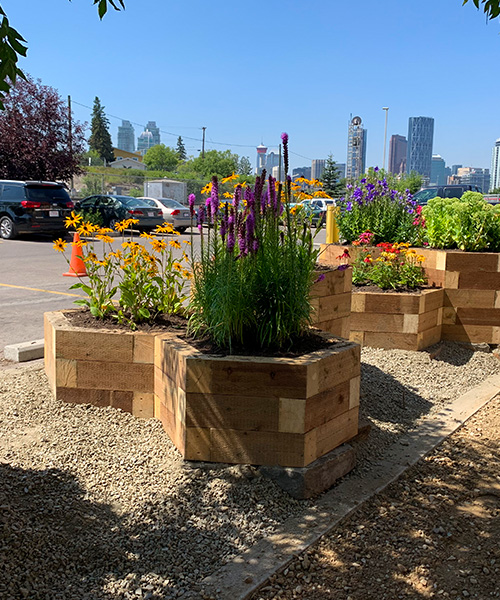
-
CASE 3: ATLANTIC AVENUE ART BLOCK (CALGARY)
The Atlantic Avenue Art Block, located at the gateway to Calgary’s oldest community, unites commerce and culture, with a contemporary art gallery, retail shops and office spaces. Thanks to Mike Hill’s passion and commitment to community-building, the hive project ended up benefiting the whole local community.
What the bees inspired them to do
- Installing gorgeous pollinator-friendly planters
- Conducting educational workshops for the local community
- Selling honey and hive products at a local store
- Donating sales proceeds to a local food centre
Following the installation of the hive project, beautiful planters were designed, installed in the back of the building and filled with pollinator-friendly plant species to offer food to pollinators throughout the season. To create bridges between residents and the thousands of winged newcomers to the neighborhood, Alvéole’s educational workshops and hands-on activities were facilitated by the Esker Art Gallery and donated to the local Inglewood community.
At the end of the season, the harvested ultra local honey and other products from the hive were sold through Bite, a specialty grocery store located on the street level of the building. All the proceeds generated were donated to The Alex Community Food Centre, providing people with access to high-quality food through healthy meals and an affordable produce market.
-
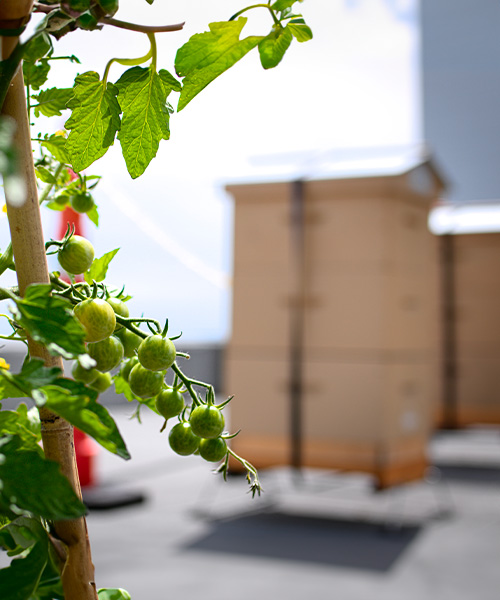
-
CASE 4: SSQ INSURANCE (QUÉBEC CITY)
The Atlantic Avenue Art Block, located at the gateway to Calgary’s oldest community, unites commerce and culture, with a contemporary art gallery, retail shops and office spaces. Thanks to Mike Hill’s passion and commitment to community-building, the hive project ended up benefiting the whole local community.
What the bees inspired them to do
- Building an edible garden on their rooftop
The beautiful rooftop garden of SSQ Insurance is hard to miss – you can admire it from the inside of the building, a treat for both visitors and staff alike.
What seems like an infinite line of precisely 136 Smart Pots are home to greens, veggies, fruit, edible flowers and fine herbs – an urban oasis built and tended to by local urban ag company Les Urbainculteurs (Dominique Manny, Operations Manager, took this gorgeous picture).
Right next to them are SSQ’s bees, zooming in and out of the hive, hard-at-work. With the river on one side and the downtown area on the other, the bees are thriving in this beautiful setting, feasting on the nectar and pollen offered by the garden, contributing in turn to its productivity. And when the fruit, veggies, herbs and green are ready to be harvested, they are picked and given to a local community organization.
-
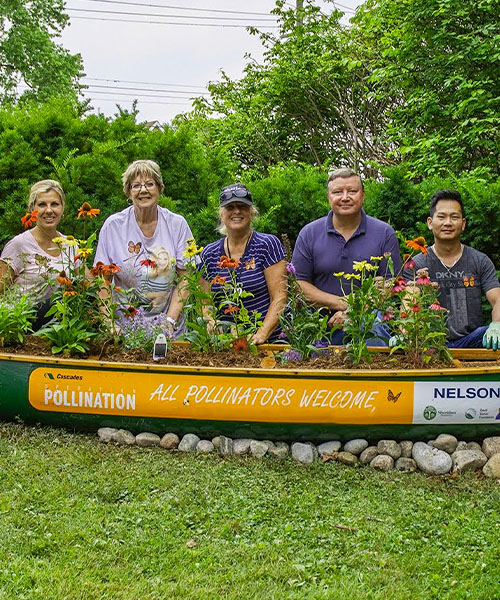
-
CASE 5: CASCADES RECOVERY+ (TORONTO)
In 2018, the David Suzuki Foundation launched a new program called “Butterfly Way”, a citizen-led movement growing highways of habitat for bees and butterflies.The project aims to help people step up efforts to help pollinators find food and shelter.
Candice Ruggero, Account Sustainability Manager at Cascades Recovery+, was inspired to bring this program to her workplace. After all, the company is a national partner of the Foundation.
What the bees inspired them to do
- Building gardens filled with local pollinator plant species at four customer sites
- Beginning to develop a network of pollinator gardens in the GTA
After being trained herself as a “Pollinator Ranger”, Candice wanted to push things further and engage Cascades Recovery’s customers to build pollinator gardens at their company site.
In 2019, along with her colleagues Jason, Sarah, Simon and Jennifer, as well as the David Suzuki Foundation and Sheridan Nurseries, Candice contributed to the construction of gardens filled with local pollinator plant species at four of their customer sites.
The next step is to expand this even further – to include more customers and get Cascades employees engaged through planting pollinator patches at their own houses.
“Although it is only the first year of the project, customer feedback has been incredible, and the gardens will add over 100 square feet of vital pollinator habitat. This will help grow butterfly and bee habitats which are critically important insects to produce food around the world, and it begins to develop a network of “Pollinator Gardens” in the GTA.”
– Candice Ruggero, Account Sustainability Manager
-
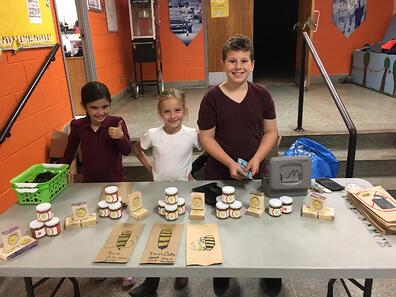
-
CASE 6: TWIN OAKS ELEMENTARY SCHOOL (MONTREAL)
A couple of years ago, Twin Oaks Elementary School received their first hive and began teaching the entire school population about bees and their importance in our ecosystems and food production. Since then, they’ve added a second hive to their installation and plan several yearly projects to support the hives and pollinator gardens.
What the bees inspired them to do
- Creating an “Earth Ranger Club” (now up to 40 young members!)
- Planting a pollinator garden
- Becoming Friend of the Monarch certified in 2019
The bees inspired the teaching staff at Twin Oaks to create an inclusive club of Earth Rangers – now counting more than 40 dedicated members, the club is divided into a senior and junior group with four teachers leading weekly meetings during lunch hour.
They’ve also added a pollinator garden to the bee project, planting flowers that help building up bee and butterfly populations, and worked with the David Suzuki Foundation and the city of Laval to be adopted as Friends of the Monarch in the fall of 2019.
“It’s been an incredible journey for not only the students but teachers, staff and the community as well.”
– Karen Stoddart
-

-
CASE 7: EQ OFFICE (CHICAGO)
Before the arrival of their newest 50,000 winged tenants, the property management team at EQ Office researched and consulted with their landscaping team on how to foster a pollinator-friendly rooftop terrace. The bees were welcomed at 350 North Orleans in 2019 with a bounty of nectar right on their rooftop.
What the bees inspired them to do
- Installing a rooftop pollinator garden to welcome the bees
- Offering educational and engaging workshops to building tenants
- Donating proceeds of honey sales to a bee-friendly organization
Although the terrace at 350 North Orleans existed before the hive project, the bees were a driving force to creating a pollinator-friendly habitat on their terrace space, benefiting both pollinator populations and the building’s tenants. Today, the terrace is highly frequented by tenants who enjoy taking a breath of fresh air during their busy work days or eating their lunch – and so do the bees, feasting all day, every day on the nectar and pollen of the flowers!
To create further connections between the humans and the bees of the building, the EQ team offered Alvéole workshops to the office tenants; inspiring conferences about bees, fun hive inspections with their dedicated beekeeper, and a hands-on, fun honey extraction workshop.
At the end of the season, the EQ team increased the social impact of the hive project by donating proceeds of honey sales to a bee-friendly organization in the Chicago area.
Feeling inspired? Discover what a bee program could look like at your building!
Talk to us about your tenant engagement and sustainability goals. We’ll match you with the best nature-based solution to meet your needs.